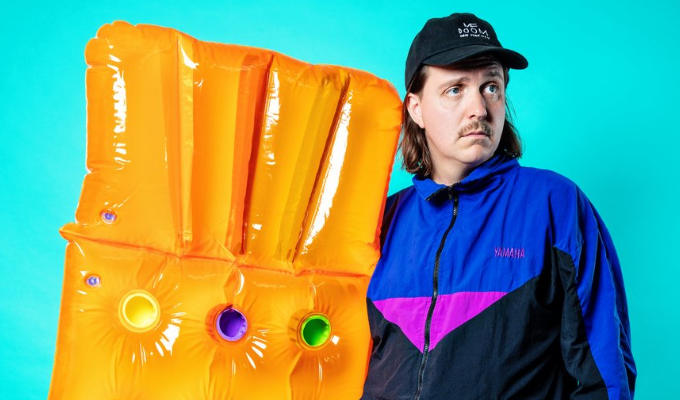Give It Up For Comic Relief
Gig review by Steve Bennett
Like so many things involving Russell Brand, Give It Up For Comic Relief was morally ambiguous.
The evening was raising funds for drug and alcohol addiction centres, yet seemed to be a veritable advert for consumption - from Noel Fielding’s tongue-in-cheek ‘Don’t Do Drugs’ reggae number, to Brand saying: ‘Many people watching this at home will be out of their minds on drugs, and that’s fine...’ Even unlikely narcotic advocate Simon Amstell, who needs little chemical help being paranoid or self-analytical,urged: ‘If you’ve never had magic mushrooms, you really must.’
How much of the pro-drugs message made it to BBC Three screens, I don’t know. But abstinence was not a popular option in Wembley Arena itself, which is odd considering the tie-in with Comic Relief. The skips full of drugs consumed by the likes of Noel Gallagher, Kasabian and Brand himself over the years are hardly likely to be Fair Trade, doing damage in the sort of Third World countries that the rest of the Comic Relief organisation works so hard to put right.
But such considerations were not for tonight. Brand wants a change in attitude to drug addiction so it’s akin to the approach to alcohol, that it’s fine to indulge as long as it’s not a dependency. That was one message of the night, the other was that viewers should text ‘give’ to 70005 and donate a fiver to treatment centres, as they watched the entertainment unfold.
And there was certainly a hell of a lot of entertainment for your £5... or £50 if you brought a ticket to the gig, which ran for three-and-a-half interval-free hours. OK, it’s not Mark Watson’s 25-hour effort of last week... but a long time to be passively viewing music and comedy. Wembley’s plastic seats weren’t built for that.
A ridiculously long running time is a hallmark of any big benefit, of course, as too is an eclectic booking policy, to maximise the appeal. There can’t be much Venn diagram overlap between fans of Kasabian and fans of Rizzle Kicks, but here they are sharing a bill. The former were the musical highlight, alongside Gallagher’s High Flying Birds , delivering a welcome reminder of just how impressive they can be with an awesomely epic version of Fire... which proved an entirely inappropriate introduction to Amstell’s low-key introspection.
Other musical acts on the bill were Emeli Sande, Paloma Faith, Jake Bugg, Jessie J and Nicole Scherzinger. The former Pussycat Doll rather gave away one reason for her involvement in the show by announcing the track Domino as: ‘This song is a positive, inspirational song. It’s also my next single.’
Besides the clumsy plug, surely you can’t tell people your own song is inspirational. I’ll decide what inspires me, and generic, club-friendly, R&B/pop sung by a girl in her pants, isn’t it.
As host, Brand warned against such ungenerous thoughts, pointing out that all the acts were performing for free. Throughout the night, he was playful about both the cause, and his own bad-boy reputation, from flirting with the girls to borrowing a female audience member’s mobile to demonstrate how to text a donation and suggesting: ‘This is the BBC and I’m playing with a phone. It’s already risky territory.’ Then turned to the woman and asked: ‘What’s your grandfather’s phone number?’
Later in the show Brand took a messianic walk among his followers in the audience, finding the most funny in banter with a young lad called Alfie, which he knew would never make the TV. ‘They’re not going to show a BBC presenter getting anywhere near a fucking kid,’ he said knowingly.
Brand was at his best, though, when padding for time from backstage as techies were setting up for bands, ad libbing like crazy yet consistently finding the funny. His banter with pal Fielding, especially, was priceless.
Fielding appeared on stage, uncredited, as hard-ass New York cop Raymond Boombox, delivering his ‘anti’-drug message, which might have been more weird than hilarious – an epitaph for much of his output – though it was entertaining watching people figure out who was behind the gaffer-tape ’tache.
He’d been preceded by Jack Whitehall, who seems to be channelling a lot of Michael McIntyre with his upper-middle-class observational incredulity. After something of a slow start, he found his pace with some material about bullying, an old and obvious gag about the campaigning wristbands notwithstanding.
Amstell injected a bold note of cynicism into proceedings. Reverting to his Pop World snidery, he questioned Jessie J’s motives in shaving her head for Red Nose Day – and even whether charity was the best way to combat the complicated problems of poverty. It was nicely contrary, but he could have used more time to expand, especially after dealing with the gear-change of following Kasabian.
After his tumultuous week at the hands of The Sun, Jason Manford delivered a solid but unspectacular observational set that probably won’t be remembered on such a packed night. Eddie Izzard was far more successful. Even if some of his initial flights of fancy into the topics of human sacrifices and Charles I’s reign didn’t quite land, his unique thought processes are always fascinating, and after padding around a while, he finally found the vein of wit, to use an entirely inappropriate metaphor.
Jimmy Carr did what Jimmy Carr does, pointed if unprincipled one-liners – some that he’s been doing for a while, and some new – accompanied by his distinctive heehaw laugh. He set a high gag-rate in the limited timeslot, and if he was setting the taste bar low, so Frankie Boyle could stomp it down through the ground.
‘I’m genuinely surprised to be here,’ he said, surely echoing the thoughts of many a BBC executive. And indeed, he was cut from the ‘almost-live’ broadcast after being brutally offensive with every perfectly-crafted line. Criticising the hypocrisy of Comic Relief while much of the West profits from Third-World strife might have touched a nerve, but it was an harsh anti-Queen setup that provoked the greatest boos of discontent among a surprisingly monarchist crowd. ‘A joke is just a proposition, a “what if”?’ he explained, as he’s probably quite used to doing. But it’s the quality of the punchlines that determine whether real offence is caused, and unlike most low-aiming wannabe shock comics, his sharp writing scores on that count.
Doc Brown, despite being the lowest-profile act on the bill, showed why he deserved to be there with a brief set featuring his boldly political comedy rap about poor tea-making technique, before the comedy was closed with John Bishop making reference to his own, more strenuous, fundraising efforts of last year. Despite spending most of his set doing the admin of emphasising the positive aspects of the night, it was Bishop, not Boyle, who caused the evening’s biggest controversy... by dissing Man Utd, since football is far more important than who rules Britain.
Still, if there was a Champions’ League for comedians, all of this line-up would be in it, ensuring the quality was maintained even if the viewer’s concentration ebbed and flowed over the long night.
Published: 7 Mar 2013






